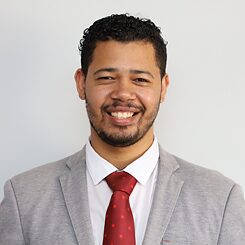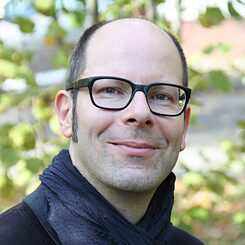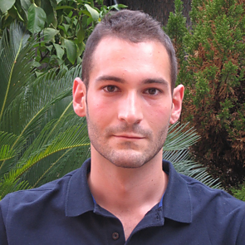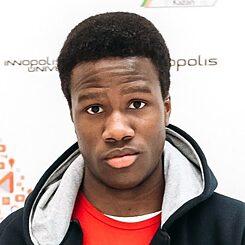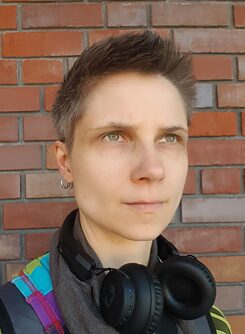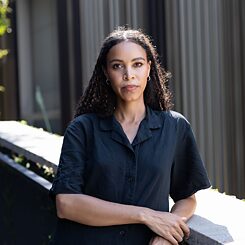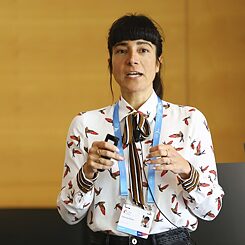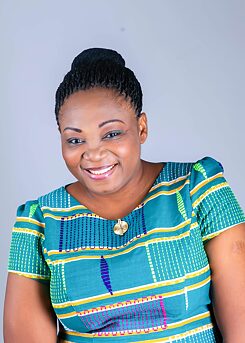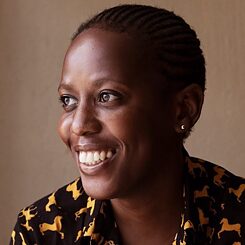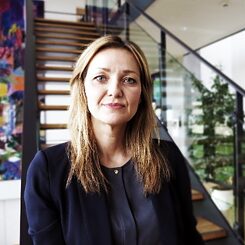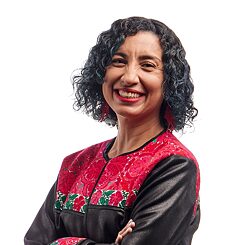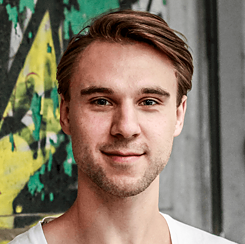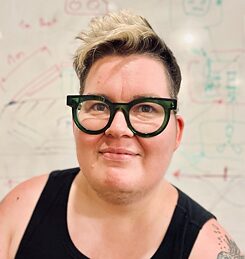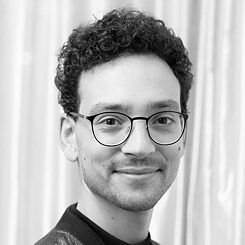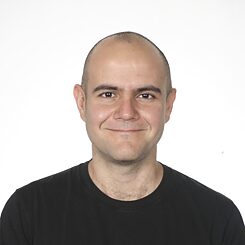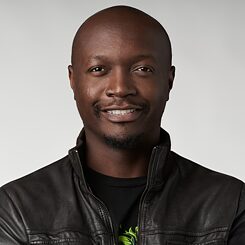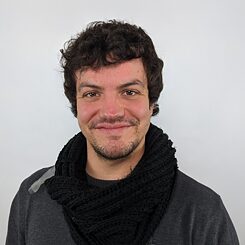Speakers
Nathan-Ross Adams
Nathan-Ross is part of a dynamic team of 4IR lawyers at the pan-African ICT law firm, Michalsons. Daily, he helps multi-national organisations develop and deploy trustworthy AI and ICT. He specialises in commercial IT transactions, data protection, information security, access to information and cybercrime law. His clients represent a range of data, technology, and advertising companies and African governments, software, hardware, robotics, biotech, pharmaceuticals, telecoms, and energy clients.Iyo Bisseck
Iyo Bisseck (she/her) is a France-based designer, researcher, and artist. Her work explores biases that show the link between technologies and systems of domination, with a specific focus on racial bias in the realization of virtual agents. She is part of the Dreaming Beyond AI collective. As an artist, she is interested in creating alternative and collaborative narratives using virtual tools. By focusing on understanding these tools and democratizing their use in the form of workshops, she hopes that the communities most marginalized by these tools would have the opportunity to shape them and create other meanings.Piotr Bucki
For 20 years, I have been teaching people how to design communication in various dimensions. I always rely on cognitive psychology and neuroscience. I test theories in practice by internationally working with companies. I have written several books, including "Let's Talk about Communication," "Find Balance," "Viral," "Presentations. Just Like That!" "Sapiens on a Shopping Spree," and the English-language book "Life's a pitch and then you die." For over 10 years, I have been collaborating with WSB, where I design courses and lecture primarily in the areas of branding, marketing, and communication. I also teach at SWPS University, SGH, and AGH. I provide training for Objectivity, Allegro, Dynatrace, Santander, Nordea IT, and others. I collaborate with the European Space Agency and GNSSA, where I co-create training programs for startups and consultants.Aljoscha Burchardt
Aljoscha Burchardt is Principal Researcher, Research Fellow, and Deputy Site Director of the German Research Centerfor Artificial Intelligence (DFKI) in Berlin. He is an expert in Language Technology and Artificial Intelligence. Burchardt is Senior Research Fellow of the Weizenbaum Institute for the Networked Society and Deputy Chairman of the Berlin Scientific Society (Berliner Wissenschaftliche Gesellschaft). He was also a member of the Enquete-commission on Artificial Intelligence of the German Parliament. Aljoscha is one of the jury members of the hackathon.R. Buse Çetin
R. Buse Çetin is a creative strategist and AI ethicist. Her work revolves around ethics, impact, and governance of AI systems. Buse is the co-founder of the AI research, advocacy and art platform Dreaming Beyond AI and she is working on AI policy and communication with AI Forensics. Buse is one of the jury members of the hackathon and the second pitching.José Eduardo
José Eduardo joined the Europeana Foundation in May 2020 as a Machine Learning Engineer in the R&D department. He holds a Bachelor's in Physics and a Master's in Applied Mathematics. His work at Europeana has focused on applying AI for improving data quality and automatic enrichment.Chris Emezue
Chris Emezue is committed to developing intelligent systems that can truly learn, even in low-resource scenarios, and are adaptable. His research areas cut across natural language processing, causality, and reinforcement learning.Felix Friedrich
Felix is a PhD student and researcher at the AIML lab at TU Darmstadt and Hessian AI. He has published at top-tier venues like Nature Machine Intelligence and ICLR about fairness and explainability of AI models. A special focus is hereby on putting the human in the loop to go beyond purely data-driven approaches. Currently, he works with his colleagues on inspecting and curating large-scale AI models to avoid unfair model behavior and promote fairness.Xenia Klinge
Xenia Klinge is a computational linguist and data scientist at the German Research Center for Artificial Intelligence, DFKI. Her professional focus lies on human-centric medical and ambient applications, as well as language and conversation in the context of health, wellbeing and culture. Further interests revolve around automatic creativity and storytelling through intelligent and/or conversational systems. She is living and working in Berlin and was part of the jury of the second pitching.Shelly Knotts
Shelly Knotts is an improvisor who performs with computers and other humans. Interests in code, data and networks have lead her down strange and diverse musical paths from electroacoustic composition, through jazz and noise music to algorave. She experiments with generative and AI techniques and opinionated algorithms to make music. She has performed at numerous Algoraves and other live coding events worldwide, solo and with collaborative projects including ALGOBABEZ. In 2017 she was a winner of BBC Radiophonic Workshop and PRSF ‘The Oram Awards’ for innovation in sound and music.
Nizenande Machi
Nizenande Machi is a Leadership Development Practitioner. She designs and delivers learning interventions for leadership development and entrepreneurial advancement of Africans in Africa and the diaspora. Her strategic work includes working with public and private sector institutions such as UN Women, Goethe-Institut, Discovery Health, Obama Foundation and British Council. She was a fellow on the Zanele Mbeki Fellowship, a network for feminist leadership in Africa, which enabled her to be part of the South Africa Advisory Panel on the UN Commission on the Status of Women in New York. Nizenande is the Founder and CEO of Karani Leadership. Through programs and funding, Karani equips artists and creatives to earn sustainable livelihoods from their endeavours. Nizenande has a Bachelor of Commerce degree in Management Studies from UCT and a Certificate on Thought Leadership for Africa’s Renewal from the Thabo Mbeki African Leadership Institute at UNISA. She is an Accredited Gallup Strengths Coach, and an Organisational & Relationship Systems Fundamentals Coach.Pelonomi Moiloa
Pelonomi is CEO of Lelapa AI- A socially grounded research and product lab driving AI for African by Africans. Pelonomi has spent 8 years in the data science domain, leading data science teams in developing and productionalising machine learning solutions in the finance industry. An engineer by training, she has Biomedical and Electrical engineering degrees from the University of the Witwatersrand and an MSc from Tohoku University where she conducted RNN research in the neurophysiology domain. A community organiser she is Trustee of the Ruth First Jeppe Memorial Trust and runs the Code Kamoso coding academy for girl teens as co-director of The Ungovernable NPC.Ramak Molavi
Ramak Molavi Vasse’i (The Law Technologist) is a digital rights advocate and senior researcher. She has been leading the Meaningful AI Transparency research project at Mozilla since September 2021.She is a visiting lecturer at the University of Potsdam and IE Law School in Madrid, and works as a policy advisor on new technologies. Her research focuses on the ethics of AI, AI governance, privacy and data protection, and the regulation of new technologies. Her interdisciplinary work is dedicated to the development of sustainable and public good-oriented technologies.
Nnenna Nwakanma
"Nnenna from the internet" is a recognized voice for systemic policy changes for development through open, rights-based and human-centered technology. She is a champion for meaningful and empowering internet and information access, freedom of expression, open data, open government, and the open web. Over two decades, she has been bringing together local and international stakeholders to advance the development cooperation agenda. Passionate about affordable internet access, data rights, digital freedom, and digital responsibilities of stakeholders, she was acknowledged by Apolitical in 2019 as one of the "World's Most 100 Influential People in Digital Government". She is one of "Africa's 50th Digital Personalities" and one of the “100 Most Influential Africans of 2021”. Nnenna is one of the jury members of the hackathon and the second pitching.
Mpho Primus (Raborife)
Prof. Mpho Primus is an NRF-rated researcher specialising in computational linguistics. She is the deputy director at the Institute for Intelligent Systems, University of Johannesburg. Amongst numerous awards she has received, she is a L’Oréal-UNESCO Women in Science sub-Saharan Regional fellow as well as the Department of Science and Technology (South Africa) Women in Science alumni, and most recently the National Research Foundation (South Africa) Research Excellence Award for Early Career/Emerging Researcher. Prof Primus has worked in numerous projects (multidisciplinary) with project partners across three continents. She currently serves on the IDEMIA Black Women’s Ownership Trust board of trustees as well as on the advisory board for the Pan African Information Communication Technology Association. She was the moderator of the AI to amplify fellowship-sessions and the panel discussion held at the Fak'ugesi festival.Lykke margot Ricard
Lykke Margot Ricard is Associate Professor at the Department of Technology and Innovation, Faculty of Engineering. University of Southern Denmark (SDU). Lykke has worked in industry and in public sector consultancy before returning to academia in 2019, where she since September 2022 is Research Group Leader of Circular Economies and Innovation as part of SDU Innovation and Design Engineering. Prof. Ricard holds the chair of SDG Collaboratorim and leads the educational programme in Product Development and Innovation. Her research is focused on sustainable innovation and design as well as sustainable technology development in general. She is a frequent and eloquent commentator in the media who has become a recognized expert in sustainability in innovation and technology as an integral part of a sustainable transition and system innovation.Paola Ricaurte Quijano
Paola Ricaurte is an associate professor in the Department of Media and Digital Culture at Tecnológico de Monterrey and faculty associate at the Berkman Klein Center for Internet & Society at Harvard University. With Nick Couldry and Ulises Mejías, she co-founded Tierra Común, a network of academics, practitioners and activists interested in decolonizing data. She participates in several expert committees, such as the Global Partnership for Artificial Intelligence (GPAI), the Global Index on Responsible AI and the Expert Group for the Implementation of the UNESCO Recommendation on the Ethics of Artificial Intelligence. She is a member of the <A+> Alliance for Inclusive Algorithms and leads the Latin American and Caribbean hub of the Feminist AI Research Network, f<A+i>r. In addition to her academic work, she participates in civil society initiatives to promote digital rights and the development of public interest technologies.Patrick Schramowski
Patrick is a research group leader at the German Center for Artificial Intelligence (DFKI). His research revolves around deep large-scale models and AI ethics. Together with his colleagues at TU Darmstadt, he aims to build human-centric AI systems that mitigate the associated risks of large-scale models and solve commonsense tasks. Recently he published in Nature Machine Intelligence, CVPR, FAccT, ICML and won the outstanding paper award at NeurIPS with the LAION-5B dataset.Katta Spiel
Katta Spiel is an Assistant Professor for 'Critical Access in Embodied Computing' at TU Wien. They research marginalised perspectives on embodied computing through a lens of Critical Access. Their work informs design and engineering supporting the development of technologies that account for the diverse realities they operate in. In their interdisciplinary collaborations with neurodivergent and/or nonbinary peers, they conduct explorations of novel potentials for designs, methodologies and innovative technological artefacts.Quincey Stumptner
Quincey Stumptner (he/him) has a background in philosophy, politics and economics with a focus on technology policy and the societal impacts of digital technologies. He researched on data ethics and the ethics of policy making and has gained diverse professional experiences in the start-up world, international cooperation and policy institutions. As a Foresight Policy Lead at SUPERRR Lab he works on intersectional and decolonial approaches to technology foresight and connects SUPERRR’s research to actors from policy, politics and civil society. Aside his role at SUPERRR Lab he moderates discussions and facilitates workshops in the field of technology, futuring and intersectional and decolonial practices. Quincey Stumptner was the moderator of the Hackathon.Marcelo Torres
He is the Regional Director of Business Development at Laboratoria, an organization that exists to promote a more diverse and inclusive digital economy by training underserved women in LATAM to learn Web Development or UX Design, and promoting their capabilities to help them find their first job in the IT sector.Alexander Tsado
Alexander Tsado is a futurist, ex-UN speaker and contributor to the Africa Union on its AI Blueprint. He was responsible for deploying Nvidia's first AI GPUs on the public cloud, founded a non-profit to help Africa keep pace with AI developments and currently runs Ahura AI, an Edtech company using AI to help the workforce learn as fast as the pace of change.Tijs Vandemeulebroucke
Since July 2021, Tijs Vandemeulebroucke works as a post-doc researcher at the Bonn Sustainable AI Lab of the University of Bonn where he focusses on the sustainability of AI technologies in healthcare settings from a global socio-environmental perspective. Tijs obtained a MA-degree in Theology and Religious Studies (KU Leuven, 2013) and a MA-degree in Philosophy (KU Leuven, 2015). After he obtained his Ph.D. with the study The Use of Socially Assistive Robots in The Care for Older Adults: A Socio-Historical Ethical Analysis (KU Leuven, 2019). In 2020, he was granted the “Doctoral Dissertation Award on Artificial Intelligence and Ethics” by Microsoft & the Pontifical Academy for Life.Effy Vayena
is a Professor of Bioethics at the Swiss Institute of Technology (ETH) and renowned expert at the intersection of medicine, data, and ethics. Her work focuses on important societal issues of data and technology as they relate to scientific progress and how it is or should be applied to public and personal health.
Prof. Vayena completed her education as a social historian with a PhD in Medical History from University of Minnesota. A keen interest in health policy has led her to work with the World Health Organisation on ethical questions around reproductive medicine and research. As a professor of health policy, she founded the Health Ethics and Policy Lab to tackle pressing questions that arise through technological advances such as genomic technologies in healthcare and research. She received her habilitation from the University of Zurich in the field of bioethics and policy and has been appointed a Visiting Professor at the Center for Bioethics at Harvard Medical School and a Faculty Associate at the Berkman Klein Center for Internet and Society at Harvard University, where she was previously a Fellow.

